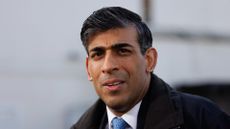Government accused of ‘flawed decisions’ based on ‘misleading’ Covid data
Ministers could have made ‘very different decisions’ with accurate figures, says scientist

Tory MPs have accused the government of making “flawed decisions based on misleading data” after new figures revealed one in four patients classed as a Covid hospitalisation were admitted for other reasons.
Updated NHS data shows that a significant number of patients classified as Covid-19 admissions had another primary cause of hospitalisation. Of the 5,021 patients who were this week listed as being hospitalised by Covid, 1,166 were admitted for other reasons.
This is data that has “regularly been referred to by ministers and at Downing Street briefings”, The Telegraph says, with “hospital pressures” caused by coronavirus admissions “frequently cited as a reason to retain restrictions”.
Subscribe to The Week
Escape your echo chamber. Get the facts behind the news, plus analysis from multiple perspectives.

Sign up for The Week's Free Newsletters
From our morning news briefing to a weekly Good News Newsletter, get the best of The Week delivered directly to your inbox.
From our morning news briefing to a weekly Good News Newsletter, get the best of The Week delivered directly to your inbox.
One leading scientist has said the government might have made “very different decisions about restrictions” had it had access to data “which actually measured the situation accurately”.
Professor Carl Heneghan, director of the Centre for Evidence-Based Medicine at the University of Oxford, said: “This data shows that, for the last month, around one in four Covid hospital cases were admitted primarily for another reason.
“At the peak of the pandemic in January, we were talking about close to 40,000 patients in hospital – this new data suggests that back then around 10,000 of them were primarily there for other reasons.”
Former Tory leader Sir Iain Duncan Smith added that the new figures show NHS data collection had been “really poor”, leading to ministers “too often sitting on misleading data, which often leads to flawed decision-making.
“It really does not speak well that they have not been forthcoming in what the real figures are. These figures will be having a direct impact on some of the decisions that have been made and are being made.”
Sir Graham Brady, chairman of the 1922 committe of Tory backbenchers, was another to bemoan the lack thus far of timely data. It was, he said, “frustrating and ridiculous that this was not available months and months ago”.
Earlier this week an analysis of leaked NHS data by The Telegraph found that more than half of patients classed as Covid hospitalisations tested positive only after admission, with the figures suggesting that “large numbers of patients” were being categorised as Covid patients when it was “not the primary cause” of their admission.
The analysis prompted calls for health officials to “urgently” publish data that distinguished between primary Covid admissions and those who were infected during their hospital stay, figures that have now been released by NHS England.
While hawkish Tory ministers may wish the country had opened up more quickly, Boris Johnson has remained resolute that the delay to the UK’s unlocking meant more people were vaccinated before restrictions were almost completely removed.
An estimated 60,000 lives have been saved and 22 million Covid-19 infections have been prevented by the UK’s rapid vaccine rollout, according to figures released by Public Health England. The data also suggests more than 52,000 hospital admissions have also been prevented.
And ministers keen to leave all restrictions behind may be out of step with public opinion regardless of the revised NHS figures, a new poll from Politico suggests, with almost half of the public believing restrictions were lifted “too soon”.
In a poll of 1,500 people, 46% of respondents said it was “too soon” to lift restrictions entirely, compared to 33% who thought it was the right time. Only 12% said it was “too late” and that restrictions should have been eased earlier. The findings suggest that “Brits largely remain wary of the virus” and will continue to take “a number of precautions whether required by law or not”, the site says.
Create an account with the same email registered to your subscription to unlock access.
Sign up for Today's Best Articles in your inbox
A free daily email with the biggest news stories of the day – and the best features from TheWeek.com
Sorcha Bradley is a writer at The Week and a regular on “The Week Unwrapped” podcast. She worked at The Week magazine for a year and a half before taking up her current role with the digital team, where she mostly covers UK current affairs and politics. Before joining The Week, Sorcha worked at slow-news start-up Tortoise Media. She has also written for Sky News, The Sunday Times, the London Evening Standard and Grazia magazine, among other publications. She has a master’s in newspaper journalism from City, University of London, where she specialised in political journalism.
-
 Who actually needs life insurance?
Who actually needs life insurance?The Explainer If you have kids or are worried about passing on debt, the added security may be worth it
By Becca Stanek, The Week US Published
-
 Sexual wellness trends to know, from products and therapies to retreats and hotels
Sexual wellness trends to know, from products and therapies to retreats and hotelsThe Week Recommends Talking about pleasure and sexual health is becoming less taboo
By Theara Coleman, The Week US Published
-
 Is the AI bubble deflating?
Is the AI bubble deflating?Today's Big Question Growing skepticism and high costs prompt reconsideration
By Joel Mathis, The Week US Published
-
 Less than total recall
Less than total recallEditor's Letter Why our brains want to forget the darkest days of the pandemic
By Theunis Bates Published
-
 'A wonky bureaucratic tweak has dramatically changed how Americans drive'
'A wonky bureaucratic tweak has dramatically changed how Americans drive'Instant Opinion Opinion, comment and editorials of the day
By Harold Maass, The Week US Published
-
 Will Aukus pact survive a second Trump presidency?
Will Aukus pact survive a second Trump presidency?Today's Big Question US, UK and Australia seek to expand 'game-changer' defence partnership ahead of Republican's possible return to White House
By Sorcha Bradley, The Week UK Published
-
 It's the economy, Sunak: has 'Rishession' halted Tory fightback?
It's the economy, Sunak: has 'Rishession' halted Tory fightback?Today's Big Question PM's pledge to deliver economic growth is 'in tatters' as stagnation and falling living standards threaten Tory election wipeout
By Harriet Marsden, The Week UK Published
-
 Why your local council may be going bust
Why your local council may be going bustThe Explainer Across England, local councils are suffering from grave financial problems
By The Week UK Published
-
 Rishi Sunak and the right-wing press: heading for divorce?
Rishi Sunak and the right-wing press: heading for divorce?Talking Point The Telegraph launches 'assault' on PM just as many Tory MPs are contemplating losing their seats
By Keumars Afifi-Sabet, The Week UK Published
-
 'Making Russia pay for its aggression with its own assets has undeniable moral and practical appeal'
'Making Russia pay for its aggression with its own assets has undeniable moral and practical appeal'Instant Opinion Opinion, comment and editorials of the day
By Harold Maass, The Week US Published
-
 How would a second Trump presidency affect Britain?
How would a second Trump presidency affect Britain?Today's Big Question Re-election of Republican frontrunner could threaten UK security, warns former head of secret service
By Harriet Marsden, The Week UK Published